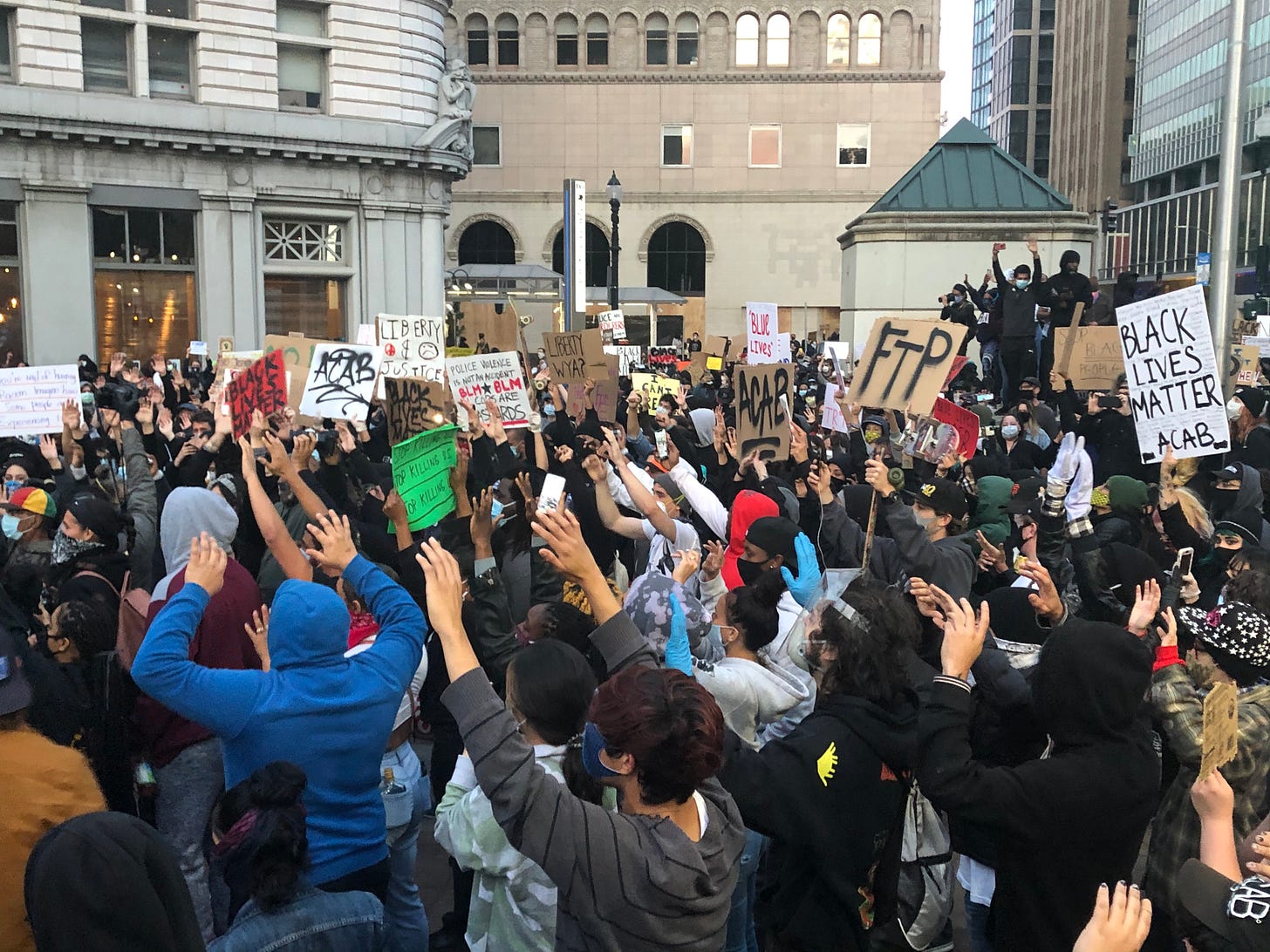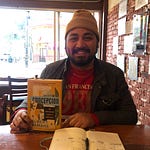
Hi everyone,
I’m doing Loitering a little differently today. No transcript — what you’ll read here is different from what you will listen to. Hope you’ll do both.
On Friday night, I went to a protest in downtown Oakland. Just a few days prior I had been asking friends how they felt to meet in person while safe social distancing, as a sort of temperature check to see how people were feeling given COVID-19. But by Friday, it was clear that many people’s first big social gathering in the pandemic was going to be a protest. It was for me.
I reached out to a producer at a show on New York Public Radio I sometimes contribute to, The Takeaway, and while I didn’t get a formal commission — they couldn’t predict how the news would play out over the weekend to know what Monday’s show would be — they alerted their executive producer and we agreed to stay in touch. This is what’s called “stringing” in journalism. Without a formal go-ahead, I could have said no, but the gravity of the moment was too big. A friend came over and we went together.

Social distancing in this kind of situation is impossible, as you can see. And it’s not like the people there were oblivious either. “The risk in the minds of many Black and Brown people is worth it,” Cat Brooks and Rebecca Ruiz of the Anti-Police Terror Project said in a statement to The Mercury News about the protests. “It’s a conundrum because we want to live but, also, we want to live.”
I didn’t end up doing any interviews on Friday — there was too much to absorb, too much movement to feel like I could concentrate on that while also taking the necessary pictures to post to social media for this kind of breaking news situation. But beyond that, I also admittedly didn’t have it in me to ask people why they were there. Just as it’s exhausting for black people to constantly have to explain themselves to the world, it’s exhausting to be the journalist on the other end asking them to repeat the trauma of their lives — and for what, the sake of a good sound bite? For what audience? It’s so painfully obvious why they’re there. The crowd that night was mostly younger people of all backgrounds. I didn’t need to ask.
I woke up the next two days feeling heavier than I have in a long time, Sunday especially. After spending a good portion of the night scrolling through Twitter and following in real-time the violence and frenzy that escalated, I started Sunday morning biking to the stores nearby that had been broken into and looted, to scope out what had happened. And who was doing that looting? The passive voice is shining at this moment because it’s hard to pinpoint. But also, as Trevor Noah and others have pointed out, spending so much time trying to distinguish between protestors and looters and rioters misses the point: The current social contract is not working.
Later on Sunday, a car caravan protest organized by the Anti-Police Terror Project began at the Port of Oakland, to move throughout the city. The Anti-Police Terror Project has been organizing around police terror since the murder of Oscar Grant in 2009 at Oakland’s Fruitvale BART Station. Its goal is to engage in what they call “radical reform policies” that don’t reinforce the status quo, its co-founder Cat Brooks told me.
By then, I was back in touch with the executive producer at The Takeaway and more motivated to go and interview the protestors (this is where this Loitering interview with Fay and Susan comes from). As some have commented — and this is mostly a critique of national media — many news reports are drowning out the voices of demonstrators. The car caravan, though, attracted thousands of people, including a lot of families, older people, white people and POCs wanting to be present but also wanting to social distance. People were on foot, bike and car, wearing signs on their backs and affixed to their car doors, and listening to the organizers pump up the crowd with music and directions on 88.1 FM — which, according to my friend Wikipedia, seems to be a station owned by El Cerrito High in the Bay Area. Not sure the backstory of how that came into fruition (“I have no idea,” Cat Brooks told me. “I have an amazing team”). But it was a novel form of protest, especially in a pandemic.
You can read more about it in this article by Johana Bhuiyan at the LA Times.

And below are Fay Rohrbach and Susan Schulman, whose interview you can listen to above. Fay is the one in the orange mask.

Also… if you’re alarmed at the level of violence police are escalating against black people, protestors and media workers, good. It is alarming.
What are you going to do with that knowledge? My cousin texted me last night if I knew whether blackout Tuesday meant more people would be protesting. It was the first time I had heard of it, although if you’re on Instagram today, you may be seeing it all over your feeds. A social media protest can often become an empty gesture, especially on a platform like Instagram owned by a company its own workers are criticizing for its inactions on President Trump’s inflammatory comments. But I at least had to be a bit more myopic in considering this black square. Instagram, for me, is a visual diary, a mesh of photos related to work as well as family, friends and moments that take my breath away. Thinking about others like George Floyd whose breaths are taken away for entirely different reasons, the choice is clear: I want to remember this moment in history and what I was doing at this time.
It’s true that too much social media (which I know I’ve been guilty of!) can be fatiguing. Here are a few links of the audio-visual variety that require some sit-down viewing and listening as opposed to skimming:
Listen to The Takeaway’s segment on the pain fueling demonstrations (and hear some Oakland too).
“There’s no right way to protest because that’s what protest is.” And more wisdom from Uncle Trevor. I recommend listening in full.
A brief story on a big issue I reported for Marketplace News.
A look at how the Indian police is trying to rebrand in a pandemic.
I’d love feedback, or just to hear from you, so please feel free to get in touch. And if you know someone you think may like to read or listen to Loitering, please share. Thanks.













Share this post